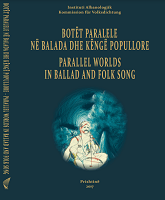SINGING BACK: THE ROLE OF PARALLEL WORLDS IN CONSTRUCTING THE SELF-IDENTITY OF IRISH TRAVELLERS
SINGING BACK: THE ROLE OF PARALLEL WORLDS IN CONSTRUCTING THE SELF-IDENTITY OF IRISH TRAVELLERS
Author(s): Gerald Porter
Subject(s): Music, Ethnohistory, Other Language Literature, Politics and society, Culture and social structure , 19th Century
Published by: Instituti Albanologjik i Prishtinës
Keywords: Irish Travellers; “Tinker”; Ireland; Scottish Ballad; Tales;
Summary/Abstract: Referring to the song culture of nomadic metal workers (Travellers or, negatively, “tinkers”) in Ireland, Mary Burke asserts that ‘the ballad tradition of Ireland is arguably a Traveller art form’.1 She does not back this bold claim, but the volume, diversity and distribution of their songs certainly supports this, at least for songs in English and macaroni songs featuring worlds in shelta (or cant). The Travellers were very long-established nomadic group whose main occupation was metal work. They later spread to Scotland and England. Since the ability to work with metals once seemed very close to magic, tinsmiths clearly had high status, which is seen today in the many songs of sexual prowess which feature them as heroes. By the end of the 19th century however, their status had declined as a result of poverty, lack of education and repeated exclusion by the settled population. It was not until 1988 that Travellers began to be described in legislation as an ethnic group with special requirements, and by 2000 they were recognised as a group with equal status, because of their shared history, culture and traditions, which included a nomadic way of life. In 2002 a separate volume of the Irish Census was devoted to them. These changes came about as a result of the rising awareness of the Irish Traveller community and of their distinct and positive role in Irish society. In particular, like the Roma (Gypsies), they were seen as social victims rather than petty criminals. Drawing on the work of Burke, and on songs collected both in Ireland and the Diaspora, this paper suggests ways in which the widespread and distinctive singing culture of the Travellers contributed to this politicization. Drawing on the work of Emily Lyle and others, this paper examines the construction of alternative, parallel or parodic worlds in songs, a practice which draws on the numerous folktales told by Travellers which show mortals flying, hearing ethereal music or encountering otherworld creatures like elves and change lings, but also relates to recent work in gender studies on resistance and identity.
Book: BOTËT PARALELE NË BALADA DHE KËNGË POPULLORE
- Page Range: 319-340
- Page Count: 22
- Publication Year: 2017
- Language: English
- Content File-PDF

